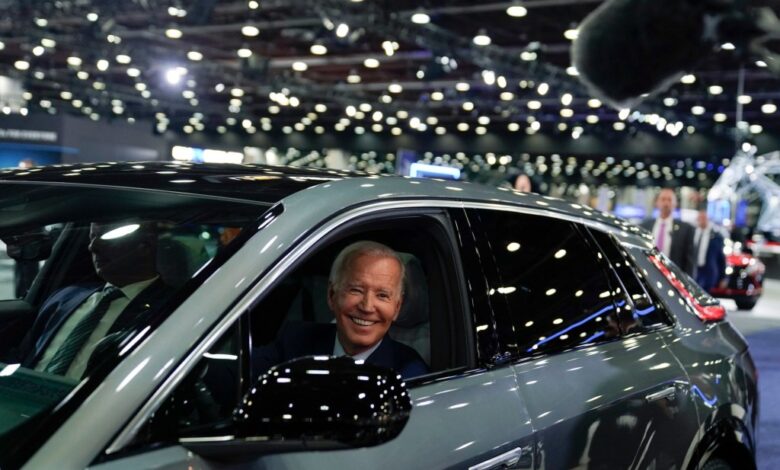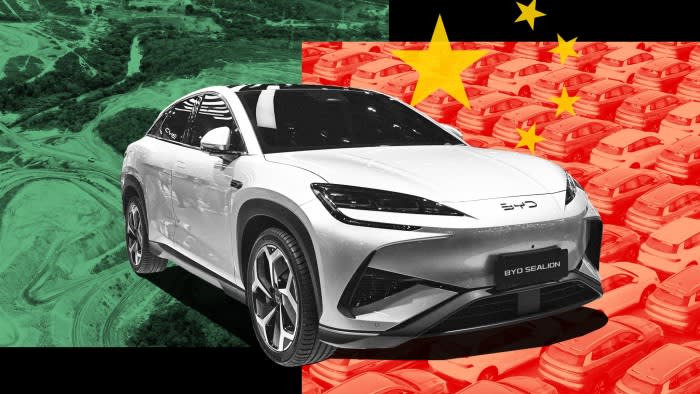Electric vehicle mandates are an attack on liberty and free enterprise – Orange County Register

FILE – President Joe Biden drives a Cadillac Lyriq through the showroom during a tour at the Detroit Auto Show, Sept. 14, 2022, in Detroit. Biden, a self-described “car guy,” often promises to lead by example by moving swiftly to convert the sprawling federal fleet to zero-emission electric vehicles. But efforts to help meet his ambitious climate goals by eliminating gas-powered vehicles from the federal fleet have lagged. (AP Photo/Evan Vucci, File)
In a recent interview, Secretary of Transportation Mayor Pete Buttigieg lamented the supposed recalcitrance of consumers hesitant to buy electric vehicles: “I feel like it’s the early 2000s and I’m talking to some people who think that we can just have landline phones forever.”
Last we checked, nobody ever thought to mandate cell phones. The reason the Biden administration and its allies in California are using coercive government force to compel electrification is because consumers correctly see that EVs aren’t ready for prime time. Nowhere is that clearer than with the current push to force the electrification of the nation’s heavy-duty fleet.
Electric cars are more expensive, have less range, and are less reliable than their conventional counterparts. But there are at least some use cases where they can make sense– such as short commutes in urban areas, with significant charging infrastructure. Heavy-duty vehicles are different. New battery electric trucks cost more than twice as much, haul less than half as much, and have only a tiny fraction of the range of their conventional counterparts. Electrification of these trucks will be literally impossible in many instances, and enormously costly in all others. That’s why there are essentially zero electric heavy-duty vehicles on the road today.
That hasn’t stopped the Biden administration or California from charging ahead. Biden’s EPA just announced new standards to force electrification of some 40%-50% of the heavy-duty fleet by 2032. Not to be outdone, California has set for itself a goal that no new internal-combustion engine vehicles be sold by 2035 and that no internal-combustion trucks and vans be on the road at all by 2045.
Consider California’s most recent rules, the so-called “Advanced Clean Fleets” regime. Worried that fleet owners might just hang onto their old conventional trucks instead of buying California’s preferred electric vehicles, the state has created a new program that requires certain disfavored fleets with vehicles that cross into California—even for a single day—to scrap their existing internal-combustion vehicles and replace them with electrics.
There’s nothing particularly “advanced” about this new purchase mandate. If battery-electric trucks really were “advanced,” then private fleets would already be buying them. The reason they aren’t is that electric trucks will drive up costs, slow down transportation, and further stress an electric grid already near the breaking point. And when trucking gets more expensive and less reliable, everything else does too: groceries, diapers, baby formula, and every other consumer good. It’s not just the trucking companies that will pay for this. We all will.
As explained in our new legal challenge to these rules, California’s scheme is completely illegal. Indeed, it is forbidden (or, in the argot of constitutional law, “preempted”) by federal law in at least three separate ways. The Clean Air Act expressly prohibits states from “adopt[ing]” or even “attempt[ing] to enforce” state laws or rules “relating to the control of emissions from new motor vehicles.” The Energy Independence and Security Act gives the Department of Transportation exclusive nationwide authority to set the “maximum feasible” improvements in truck efficiency. And the Federal Aviation Administration Authorization Act “pre-empt[s] state trucking regulation” “related to a price, route, or service” of a trucking fleet.
California knows full well that it has no legal authority for what it’s doing. To avoid a legal reckoning, it has taken to leveraging its market power and the threat of regulatory retaliation to bring industry to heel. To pick one sad example, auto manufacturer Stellantis (the maker of Chrysler, Dodge, Jeep, and RAM) recently came cringing to California for compliance “flexibility,” agreeing in exchange to go along with California’s rules even if they are struck down in court. Those waiting for big business to push back on climate insanity shouldn’t hold their breath.
Negotiating away free enterprise and economic freedom won’t work. The only way to stop California and President Biden’s “whole of government” approach to degrowthing the American economy to net-zero carbon is to fight back—in the courts and in the court of public opinion. The American Free Enterprise Chamber of Commerce is in this fight for the long haul. And we must win this fight.
The price of electric vehicle mandates on every American business and consumer—and on the prosperity of future generations—is unaffordable, unsustainable, and un-American.
Gentry Collins is CEO of the American Free Enterprise Chamber of Commerce.` Machalagh Carr is president of AmFree’s Center for Legal Action



